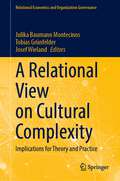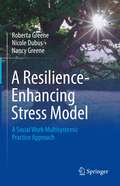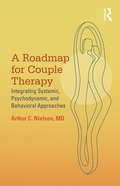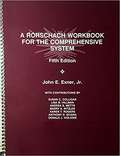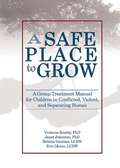- Table View
- List View
A Reader Friendly Guide to Identifying, Understanding, and Treating Adult Attention Deficit/ Hyperactivity Disorder
by Michele Novotni Thomas A. Whiteman"WHY DON’T YOU THINK BEFORE YOU ACT? ARE YOU EVEN LISTENING? CAN’T YOU JUST RELAX AND TAKE IT EASY? These are the kinds of comments and criticisms that adults with Attention Deficit/Hyperactivity Disorder hear. The truth is, inattentiveness, unfinished projects, inconsistency, impulsivity, are not chosen behaviors designed to drive others crazy.They’re common symptoms of a much greater problem that affects millions of adults—Attention Deficit/Hyperactivity Disorder (AD/HD), formerly known as ADD."-Back Cover
A Reader in Visual Agnosia: To See But Not To See
by Jane Riddoch Glyn HumphreysThe case study of John has provided a unique insight into the nature of visual agnosia and more broadly into the underlying processes which support human vision. After suffering a stroke, John had problems in recognizing common objects, faces, seeing colours, reading and finding his way around his environment. A Reader in Visual Agnosia brings together the primary scientific papers describing the detailed investigations for each visual problem which the authors carried out with John, known as patient HJA. This work was summarised initially in To See But Not To See (1987), and 26 years later in A Case Study in Visual Agnosia Revisited (2013). The chapters are divided into 6 parts corresponding to the key areas of investigation: Integrative visual agnosia Perception of global form Face perception Colour perception Word recognition Changes over time Each part contains a short introduction, written by the two leading researchers who worked with John, which highlights the relations between the papers and demonstrates the pathway of the case analysis. The book will be invaluable to students and researchers in visual cognition, cognitive neuropsychology and vision neuroscience.
A Reading of Anxiety: Lacan’s Seminar X
by Christian FierensA Reading of Anxiety follows the sessions of Lacan’s Seminar X, examining its presentation of the structure of anxiety, step by step.Christian Fierens considers why and how the structure of anxiety always depends on speech even if it remains on the threshold between the symbolic and the real and explains that there is a genuine connection between anxiety and the Lacanian object a which puts in doubt the obviousness of any object. The book then explores the importance of anxiety for the practice of the analyst, determines that the object a is fundamentally void and discusses encountering nothingness. Finally, Fierens establishes that this nothingness inside the object and inside anxiety leads to the truth of anxiety.A Reading of Anxiety will be an essential book for students as well as clinicians to find a practical way to cope with anxiety as a clinical approach to the real in psychoanalysis. It will be relevant to all readers interested in the work of Lacan.
A Really Awesome Mess
by Brendan Halpin Trish CookA hint of Recovery Road, a sample of Nick and Norah's Infinite Playlist, and a cut of Juno. A Really Awesome Mess is a laugh-out-loud, gut-wrenching/heart-warming story of two teenagers struggling to find love and themselves. Two teenagers. Two very bumpy roads taken that lead to Heartland Academy. Justin was just having fun, but when his dad walked in on him with a girl in a very compromising position, Justin's summer took a quick turn for the worse. His parents' divorce put Justin on rocky mental ground, and after a handful of Tylenol lands him in the hospital, he has really hit rock bottom. Emmy never felt like part of her family. She was adopted from China. Her parents and sister tower over her and look like they came out of a Ralph Lauren catalog-- and Emmy definitely doesn't. After a scandalous photo of Emmy leads to vicious rumors around school, she threatens the boy who started it all on Facebook. Justin and Emmy arrive at Heartland Academy, a reform school that will force them to deal with their issues, damaged souls with little patience for authority. But along the way they will find a ragtag group of teens who are just as broken, stubborn, and full of sarcasm as themselves. In the end, they might even call each other friends. A funny, sad, and remarkable story, A Really Awesome Mess is a journey of friendship and self-discovery that teen readers will surely sign up for.Releases simultaneously in electronic book format (ISBN 978-1-60684-364-2)
A Really Good Day: How Microdosing Made a Mega Difference in My Mood, My Marriage and My Life
by Ayelet Waldman'Ayelet Waldman is fearless' - Rebecca Solnit'Genuinely brave and human' - The New York Times'Wildly brilliant' - ElleThe true story of how a renowned writer's struggle with mood storms led her to try a remedy as drastic as it is forbidden: microdoses of LSD. Her fascinating journey provides a window into one family and the complex world of a once-infamous drug seen through new eyes.When a small vial arrives in her mailbox from 'Lewis Carroll,' Ayelet Waldman is at a low point. Her mood storms have become intolerably severe; she has tried nearly every medication possible; her husband and children are suffering with her. So she opens the vial, places two drops on her tongue, and joins the ranks of an underground but increasingly vocal group of scientists and civilians successfully using therapeutic microdoses of LSD. As Waldman charts her experience over the course of a month - bursts of productivity, sleepless nights, a newfound sense of equanimity - she also explores the history and mythology of LSD, the cutting-edge research into the drug, and the byzantine policies that control it. Drawing on her experience as a federal public defender, and as the mother of teenagers, and her research into the therapeutic value of psychedelics, Waldman has produced a book that is eye-opening, often hilarious, and utterly enthralling.
A Really Good Day: How Microdosing Made a Mega Difference in My Mood, My Marriage, and My Life
by Ayelet Waldman<P>A revealing, courageous, fascinating, and funny account of the author's experiment with microdoses of LSD in an effort to treat a debilitating mood disorder, of her quest to understand a misunderstood drug, and of her search for a really good day. <P>When a small vial arrives in her mailbox from "Lewis Carroll," Ayelet Waldman is at a low point. <P>Her mood storms have become intolerably severe; she has tried nearly every medication possible; her husband and children are suffering with her. <P>So she opens the vial, places two drops on her tongue, and joins the ranks of an underground but increasingly vocal group of scientists and civilians successfully using therapeutic microdoses of LSD. <P>As Waldman charts her experience over the course of a month--bursts of productivity, sleepless nights, a newfound sense of equanimity--she also explores the history and mythology of LSD, the cutting-edge research into the drug, and the byzantine policies that control it. <P>Drawing on her experience as a federal public defender, and as the mother of teenagers, and her research into the therapeutic value of psychedelics, Waldman has produced a book that is eye-opening, often hilarious, and utterly enthralling.
A Recent History of Lesbian and Gay Psychology: From Homophobia to LGBT
by Peter HegartyThis ground-breaking text explores the contemporary history of how psychological research, practice, and theory has engaged with gay and lesbian movements in the United States and beyond, over the last 50 years. Peter Hegarty examines the main strands of research in lesbian and gay psychology that have emerged since the de-pathologizing of homosexuality in the 1970s that followed from the recognition of homophobia and societal prejudice. The author details the expansion of ‘lesbian and gay psychology’ to ‘LGB’ to ‘LGBT psychology’ via its paradigm shifts, legal activism, shifts in policy makers’ and mental health professionals’ goals in regard to sexual and gender minorities. For the first time, the origins of the concepts, debates, and major research programs that have made up the field of LGBT psychology have been drawn together in a single historical narrative, making this a unique resource. A case is made that psychology has only very lately come to consider the needs and issues of transgender and intersex people, and that LGB paradigms need to be critically interrogated to understand how they can be best brokered to bring about social change for such groups. A Recent History of Lesbian and Gay Psychology will serve as an advanced historical introduction to this field’s recent history and current concerns, and will inform both those who have been a part of this history and students who are new to the field.
A Reflective Guide to Gender Identity Counselling
by Madison-Amy WebbCounselling professionals are increasingly seeking training for working with gender variant clients. Madison-Amy Webb invites them to consider a simple truth: everyone has a gender identity, whether or not they've given it much thought. By reflecting on their own gender identity through the exercises provided, counsellors can relate to clients in new and productive ways, gaining a more nuanced understanding of the issues faced by their clients and of their own identity.Incisive yet accessible, this unique guide shines a light on how the popular conception of gender identity came into being by looking at the social and historical influences at play. This context is then brought to life with a rich variety of case studies and excerpts from the author's own diary. Reflective exercises such as 'The Dressing Up Box' and 'Personal Meaning' will help readers develop a deeper understanding of their own gender identity, while clinical techniques offer new ways to connect with gender variant clients effectively. Essential reading for any counselling professional working with gender variant clients.
A Relational Approach to Rehabilitation: Thinking about Relationships after Brain Injury (The Brain Injuries Series)
by Giles Yeates Ceri Bowen Siobhan PalmerThis book is one of very few books on the topic of family adaptation and relationships after brain injury. It is an important topic because of the unique impact that such a trauma can have on families. Whether professionals are working in the community doing home visits, or working in rehabilitation and care settings where family members visit, the issues are important not just to help family members cope in adverse conditions but also to improve outcomes for the people with brain-injuries. This book will be of value to all health and social care practitioners working in the field of brain injury and chronic illness (e.g. physicians, clinical psychologists, neuro-psychologists, social workers, speech therapists, occupational therapists, physiotherapists, dieticians, nurses).
A Relational Psychoanalytic Approach to Couples Psychotherapy (Relational Perspectives Book Series)
by Philip A. RingstromWinner of the 2014 Goethe Award for Psychoanalytic and Psychodynamic Scholarship! A Relational Psychoanalytic Approach to Couples Psychotherapy presents an original model of couples treatment integrating ideas from a host of authors in relational psychoanalysis. It also includes other psychoanalytic traditions as well as ideas from other social sciences. This book addresses a vacuum in contemporary psychoanalysis devoid of a comprehensively relational way to think about the practice of psychoanalytically oriented couples treatment. In this book,Philip Ringstrom sets out a theory of practice that is based on three broad themes: The actualization of self experience in an intimate relationship The partners' capacity for mutual recognition versus mutual negation The relationship having a mind of its own Based on these three themes, Ringstrom's model of treatment is articulated in six non-linear, non-hierarchical steps that wed theory with practice - each powerfully illustrated with case material. These steps initially address the therapist’s attunement to the partners' disparate subjectivities including the critical importance of each one's perspective on the "reality" they co-habit.Their perspectives are fleshed out through the exploration of their developmental histories with focus on factors of gender and culture and more. Out of this arises the examination of how conflictual pasts manifest in dissociated self-states, the illumination of which lends to the enrichment of self-actualization, the facilitation of mutual recognition, and the capacity to more genuinely renegotiate their relationship. The book concludes with a chapter that illustrates one couple treated through all six steps and a chapter on frequently asked questions ("FAQ's") derived from over thirty years of practice, teaching, supervision and presentations during the course of this books development. A Relational Psychoanalytic Approach to Couples Psychotherapy balances a great range of ways to work with couples, while also providing the means to authentically negotiate their differences in a way which is insightful and invaluable. This book is for practitioners of couples therapy and psychoanalytic practitioners. It is also aimed at undergraduate, graduates, and postgraduate students in the fields of psychiatry, psychology, marriage and family therapy, and social work.
A Relational View on Cultural Complexity: Implications for Theory and Practice (Relational Economics and Organization Governance)
by Josef Wieland Julika Baumann Montecinos Tobias GrünfelderThis book explores the conceptual and practical implications of applying a relational view to cultural complexity. The authors take the findings of an international and interdisciplinary Delphi study on transcultural competence as a starting point and offer further analysis and interpretation from their specific perspectives. Written by experts from a variety of disciplines, the book discusses the potential contributions of a relational approach to understanding and strengthening individuals and organizations in their contexts. Through various conceptual chapters, case studies and field reports, it explores the role and nature of commonalities for cooperation in contexts of cultural complexity and discusses the relationship between differences and commonalities, as well as the implications for relational leadership and management. The book is divided into four parts, the first of which introduces readers to the relational view. In turn, the second part elaborates on transcultural competence, while the third presents various case studies and field reports on experience-based learning and relationality in culturally complex settings. Finally, the fourth part sheds new light on relational leadership and the role of commonalities in organizational practice. As such, this book will appeal to scholars and practitioners in the areas of cultural and relational economics, intercultural communication, business strategy and leadership, and organizational studies.
A Resilience-Enhancing Stress Model: A Social Work Multisystemic Practice Approach
by Nancy Greene Roberta Greene Nicole DubusSocial work practice has evolved to meet the needs of the time, the problems that are present, and the knowledge and skills available. Given the more recent rapidly changing stressful environments, political, economic, demographic, sociocultural, and ideological change has affected how practice is defined. Now it is even more essential for there to be innovative theoretical concepts and intervention strategies to support current practice. This textbook addresses today’s context of social work practice that needs to deal with the complexity of personal and social relationships, the continuing historical flux of the times, and the constant anxiety or "threats and pulls" of daily life. The text is based on the idea that social work practice requires a research and theoretical base that allows practitioners to build on a client's ability to persist in the face of life's challenges and to proceed positively with life events. The Resilience-Enhancing Stress Model (RESM) is an outgrowth of the profession’s interest in strength-based person-environment approaches — grounded in generalist social work practice that offers a range of intervention practice methods with diverse individuals, families, groups, organizations, and communities. RESM was developed to provide the skill set for working with clients and constituencies across the individual-family-community configuration during times of distress. It also can be a welcomed addition to social work practice with people undertaking life transitions and overcoming disruption to individual, family, and community function. Topics explored include:An Evolving Resilience-Enhancing Stress ModelInterviewing to Promote Resilience Among Marginalized PopulationsCo-creating a Grand Narrative: The Intersection of Individual, Family, and Community PracticeConnecting Communal Living, Ecology, and ResilienceA Resilience-Enhancing Stress Model: A Social Work Multisystemic Practice Approach is a timely text for human behavior and practice methods at the generalist or advanced generalist levels in social work. It can also be used at the doctoral level of social work education depending on the professor’s attention to the depth of theoretical concepts. Practitioners in the field may find the contents useful to their professional enrichment.
A Resource of Children's Books and Interventions for Bibliotherapy
by Tammi Van HollanderBooks and play offer safety, grounding, connection, and a feeling of mastery, in clinical, educational, and home settings. Books are a beautiful way to connect and learn more about the children and families you work with. This includes the books that children may share with you and the ones you may share with them! Even the smallest of children are mesmerized by books...only wanting more! <p><p>Most of the books listed in this resource are for ages 4-10, but can be read at any age. If the book is too long (or too short), improvise and summarize! These books will take you on magical adventures through stories that hold significant symbolism and metaphors.
A Restful Mind: Daily Meditations for Enhancing Mental Health
by Mark Allen ZabawaThe only meditation book designed to provide inspiration, support, and focus for those living with mental health problems.With A Restful Mind, Mark Allen Zabawa offers the first book designed to provide inspiration and support specifically for people living with mental health problems. A year of daily readings address the common life issues that arise for those with mental health problems and help those dealing with a disorder start or end each day more at peace with themselves and the world. By focusing thinking on positive, health-enhancing messages and presenting the kind of empathetic support that fellow contenders of emotional distress can offer, these meditations help you achieve the mental rest and self-acceptance needed for a balanced, healthy mind and peaceful life.
A Return to Love
by Marianne WilliamsonBack by popular demand -- and newly updated by the author -- the mega-bestselling spiritual guide in which Marianne Williamson shares her reflections on A Course in Miracles and her insights on the application of love in the search for inner peace.Williamson reveals how we each can become a miracle worker by accepting God and by the expression of love in our daily lives. Whether psychic pain is in the area of relationships, career, or health, she shows us how love is a potent force, the key to inner peace, and how by practicing love we can make our own lives more fulfilling while creating a more peaceful and loving world for our children.
A Rights-Based Preventative Approach for Psychosocial Well-being in Childhood (Children’s Well-Being: Indicators and Research #3)
by Murli DesaiChildren are one of the most important phase of human development and the most important target group for social work intervention. Most of the schools of human development and social work round the world have an elective course on children and some offer a concentration in this area. There are plenty of textbooks on intervention with children published by Western authors, focusing on useful theories and skills but mainly at the remedial level. They neither use the preventative approach nor the child rights perspective, which has been found useful in the developing nations. The books on child rights are generally published by the United Nations Children's Fund (UNICEF) and other international organisations working in the field of children such as Save the Children. These books focus on the useful child rights perspective but they neither integrate theories nor use the preventative approach. The proposed book A Rights-based Preventative Approach for Children's Psychosocial Well-Being: will be the first to apply the child rights perspective and the preventative approach to intervention for children's psychosocial well-being. It is an integration of theories with practice and teaching relevant in different parts of the world. The book is divided into the following three parts: Part 1: Introduction to a Rights-based Preventative Approach for Children's Psychosocial Well-Being.- Part 2: Primary Prevention for Children's Psychosocial Well-Being.- Part 3: Secondary and Tertiary Prevention for Children's Psychosocial Well-Being
A Road Back from Schizophrenia: A Memoir
by Arnhild LauvengFor ten years, Arnhild Lauveng suffered as a schizophrenic, going in and out of the hospital for months or even a year at a time. A Road Back from Schizophrenia gives extraordinary insight into the logic (and life) of a schizophrenic. Lauveng illuminates her loss of identity, her sense of being controlled from the outside, and her relationship to the voices she heard and her sometimes terrifying hallucinations. Painful recollections of moments of humiliation inflicted by thoughtless medical professionals are juxtaposed with Lauveng's own understanding of how such patients are outwardly irrational and often violent. She paints a surreal world--sometimes full of terror and sometimes of beauty--in which "the Captain" rules her by the rod and the school's corridors are filled with wolves.When she was diagnosed with the mental illness, it was emphasized that this was a congenital disease, and that she would have to live with it for the rest of her life. Today, however, she calls herself a "former schizophrenic," has stopped taking medication for the illness, and currently works as a clinical psychologist. Lauveng, though sometimes critical of mental health care, ultimately attributes her slow journey back to health to the dedicated medical staff who took the time to talk to her and who saw her as a person simply diagnosed with an illness--not the illness incarnate. A powerful memoir for sufferers, their families, and the professionals who care for them.
A Roadmap for Couple Therapy: Integrating Systemic, Psychodynamic, and Behavioral Approaches
by Arthur C. NielsenA Roadmap for Couple Therapy offers a comprehensive, flexible, and user-friendly template for conducting couple therapy. Grounded in an in-depth review of the clinical and research literature, and drawing on the author’s 40-plus years of experience, it describes the three main approaches to conceptualizing couple distress and treatment—systemic, psychodynamic, and behavioral—and shows how they can be integrated into a model that draws on the best of each. Unlike multi-authored texts in which each chapter presents a distinct brand of couple therapy, this book simultaneously engages multiple viewpoints and synthesizes them into a coherent model. Covering fundamentals and advanced techniques, it speaks to both beginning therapists and experienced clinicians. Therapists will find A Roadmap for Couple Therapy an invaluable resource as they help distressed couples repair and revitalize their relationships.
A Roadmap to Successful Scientific Publishing: The Dos, the Don’ts and the Must-Knows
by Sarah CuschieriIn the age of "publish or perish," this book provides everything one needs to know about conducting research and successfully publishing it in a scientific journal. The reader learns about the complete process of scientific publishing: from selecting the most appropriate research design, to obtaining permissions and funding, to resourcefully presenting the research results in a poster and oral presentation. Additionally, the practical tips provided here help the reader formulate a compelling scientific article and choose the most suitable journal (subscription vs. the various open access modalities) for their publication.This book also addresses "invisible aspects" of scholarly publishing that are nonetheless important and that everyone should know and understand: avoiding predatory journals, understanding the editor's perspective, and becoming familiar with the various research metrics (from author to journal) that can all determine success or failure of a publication. Written in an informal style in which the author shares personal perspectives and experiences, the book is easily accessible to the reader. The book offers early career scientists in biomedicine and medicine a unique perspective on publishing research articles and how this process can enhance the authors' "scientific value" within the scientific ecosystem as well as their personal CVs.
A Rorschach Workbook for the Comprehensive System (Fifth Edition)
by John E. ExnerA Rorschach Workbook for the Comprehensive System (Fifth Edition) by John E. Exner
A Rumor of Empathy: Resistance, narrative and recovery in psychoanalysis and psychotherapy (Psychoanalytic Inquiry Book Series)
by Lou AgostaEmpathy is an essential component of the psychoanalyst’s ability to listen and treat their patients. It is key to the achievement of therapeutic understanding and change. A Rumor of Empathy explores the psychodynamic resistances to empathy, from the analyst themselves, the patient, from wider culture, and seeks to explore those factors which represent resistance to empathic engagement, and to show how these can be overcome in the psychoanalytic context. Lou Agosta shows that classic interventions can themselves represent resistances to empathy, such as the unexamined life; over-medication, and the application of devaluing diagnostic labels to expressions of suffering. Drawing on Freud, Kohut, Spence, and other major thinkers, Agosta explores how empathy is distinguished as a unified multidimensional clinical engagement, encompassing receptivity, understanding, interpretation and narrative. In this way, he sets out a new way of understanding and using empathy in psychoanalytic theory and clinical practice. When all the resistances have been engaged, defences analyzed, diagnostic categories applied, prescriptions written, and interpretive circles spun out, in empathy one is quite simply in the presence of another human being. Agosta depicts the unconscious forms of resistance and raises our understanding of the fears of merger that lead a therapist to take a step back from the experience of their patients, using ideas such as "alturistic surrender" and "compassion fatigue" which are highlighted in a number of clinical vignettes. Empathy itself is not self-contained. It is embedded in social and cultural values, and Agosta highlights the mental health culture and its expectations of professional organizations. This outstanding text will be relevant to psychoanalysts, psychotherapists who wish to make a contribution to reducing the suffering and emotional distress of their clients, and also to trainees who are more vulnerable to the professional demands on their capacity for empathic listening. Lou Agosta, Ph.D. teaches empathy in systems and the history of psychology at the Illinois School of Professional Psychology at Argosy University. He is the author of numerous articles on empathy in human relations, aesthetics, altruism, and film. He is a psychotherapist in private practice in Chicago, USA. See www.aRumorOfEmpathy.com
A Rumor of Empathy: Rewriting Empathy in the Context of Philosophy
by Lou AgostaA rumor of empathy in vicarious receptivity, understanding, interpretation, narrative, and empathic intersubjectivity becomes the scandal of empathy in Lipps and Strachey. Yet when all the philosophical arguments and categories are complete and all the hermeneutic circles spun out, we are quite simply in the presence of another human being.
A Sad and Sorry State of Disorder: A Journey into Borderline Personality Disorder (and out the other side)
by Tracy Barker[This] is me offering hope, if that is what is needed, whether you suffer from borderline personality disorder or care for someone who does. It is me making an effort to raise awareness of this very misunderstood mental illness. Borderline personality disorder (BPD) is often considered difficult, if not impossible to treat by medical professionals. This can make the situation seem hopeless to those who are diagnosed with BPD. Based on her own experience of living with BPD, Tracy Barker shares how she has learned to manage the condition and live a full life. With poetry used to capture her lowest moments, this book gives an unfiltered look into life with BPD. Tracy shares how she has gone from being in full-time therapy to happily married, offering hope to those living with BPD, and providing awareness of the condition to their families and friends.
A Safe Place for Caleb: An Interactive Book for Kids, Teens and Adults with Issues of Attachment, Grief, Loss or Early Trauma
by Paul J. Chara Jane M. Berns Kathleen A. CharaA Safe Place for Caleb is a comprehensive and richly illustrated resource for individuals of all ages who are dealing with attachment problems. Parents, professionals, and lay people will find this book helpful in understanding and addressing attachment disorders in children, adolescents, and adults. The first half of the book is an interactive story that follows the experiences of Caleb, a young boy who relates his difficulties and frustrations in forming and sustaining healthy relationships. He learns strategies for coping with attachment issues during his journey to the Safe Tree House, where he is introduced to the four 'attachment healing keys'. These act as therapeutic tools to unlock difficulties with attachment, and are presented using text and illustrations that are easily accessible for readers of all ages, even for young children. The second half of the book presents a summary of current scientific thought on attachment styles and disorders, and provides a wide array of assessment tools, photocopiable material and healing techniques to address attachment difficulties. Lists of helpful organizations and relevant reading materials are also presented. Based on established psychological principles, the book is a unique and imaginative guide for professionals, parents, caregivers, and people of all ages who are dealing with attachment issues.
A Safe Place to Grow: A Group Treatment Manual for Children in Conflicted, Violent, and Separating Homes
by Erin Moore Vivienne Roseby Janet Johnston Bettina GentnerDiscover the effective group treatment strategies that help your school-aged clients! A child immersed in a conflicted family life may be forced to cope with a multitude of trauma, including violence, abuse, and insecurity. In A Safe Place to Grow: A Group Treatment Manual for Children in Conflicted, Violent, and Separating Homes, highly respected experts give mental health professionals the tools to provide effective group treatment for children scarred by family environments of conflict and abuse. This easy-to-understand, step-by-step manual is a developmentally appropriate treatment curriculum for traumatized school-aged children. Age-appropriate sections separate therapy for big or little kids, focusing on efficacy while presenting a comfortable multi-ethnic, multi-cultural model. A Safe Place to Grow has easy-to-understand descriptions of techniques, with each session in the curriculum containing games and activities that are therapeutic yet flexible enough to be modified whenever the situation warrants. A chapter is included to helpfully troubleshoot problems encountered when in session with either age group of children. Useful illustrations accompany the text, along with a comprehensive bibliography listing additional therapeutic resources for different types of family problems. Appendixes are included for instruction on psycho-educational groups for parents that enhance their sensitivity to their children&’s needs, as well as providing an evaluation study of the group model itself.A Safe Place to Grow provides a sequence of activities within the group model aimed at each of these five goals: creating common ground and safety exploring the language and complexity of feeling defining and understanding the self defining and revising roles and relationships restoring a moral orderA Safe Place to Grow is an essential resource for social workers, psychologists, family and child therapists, school counselors, and battered women and children&’s advocates.










